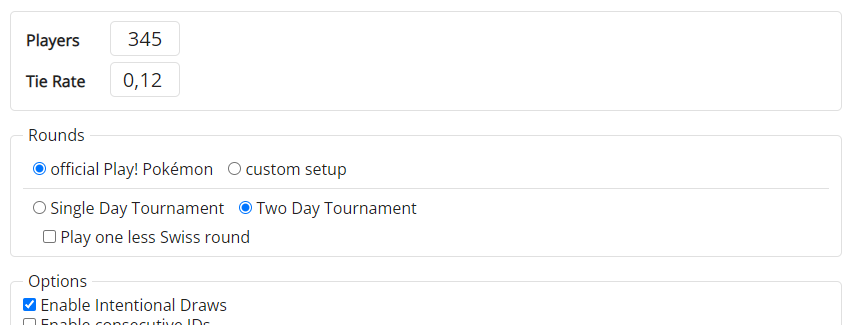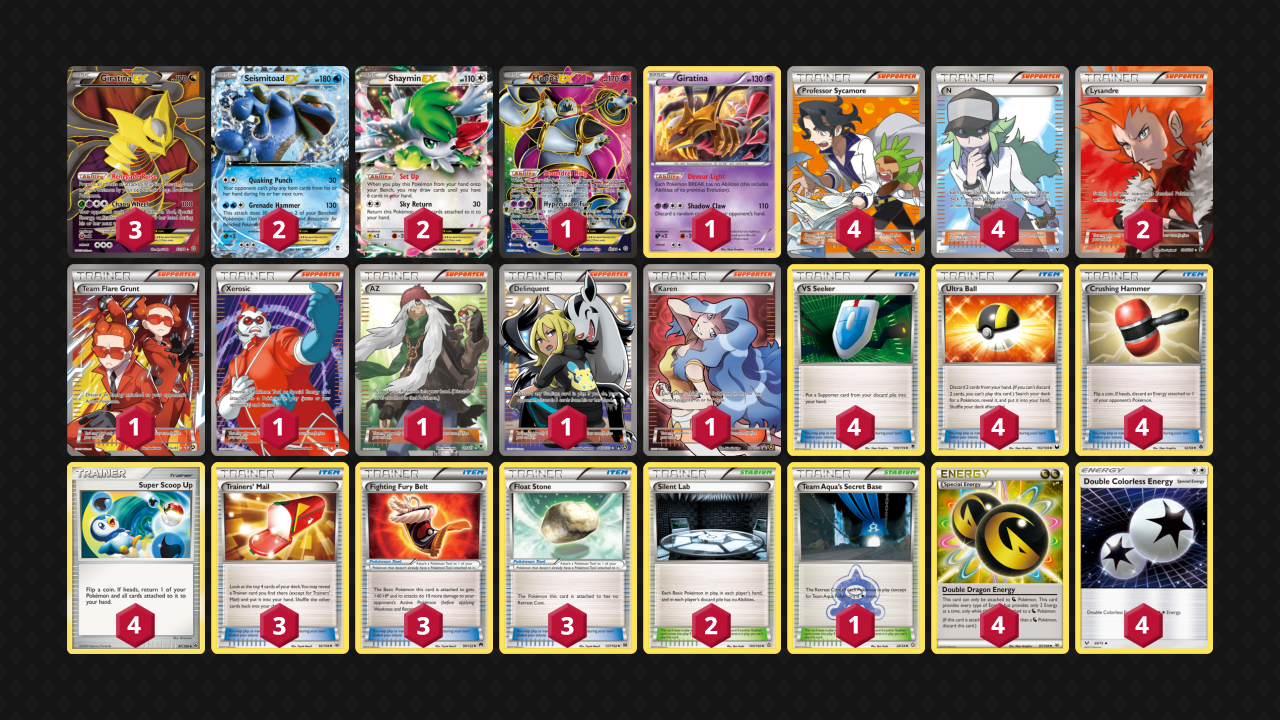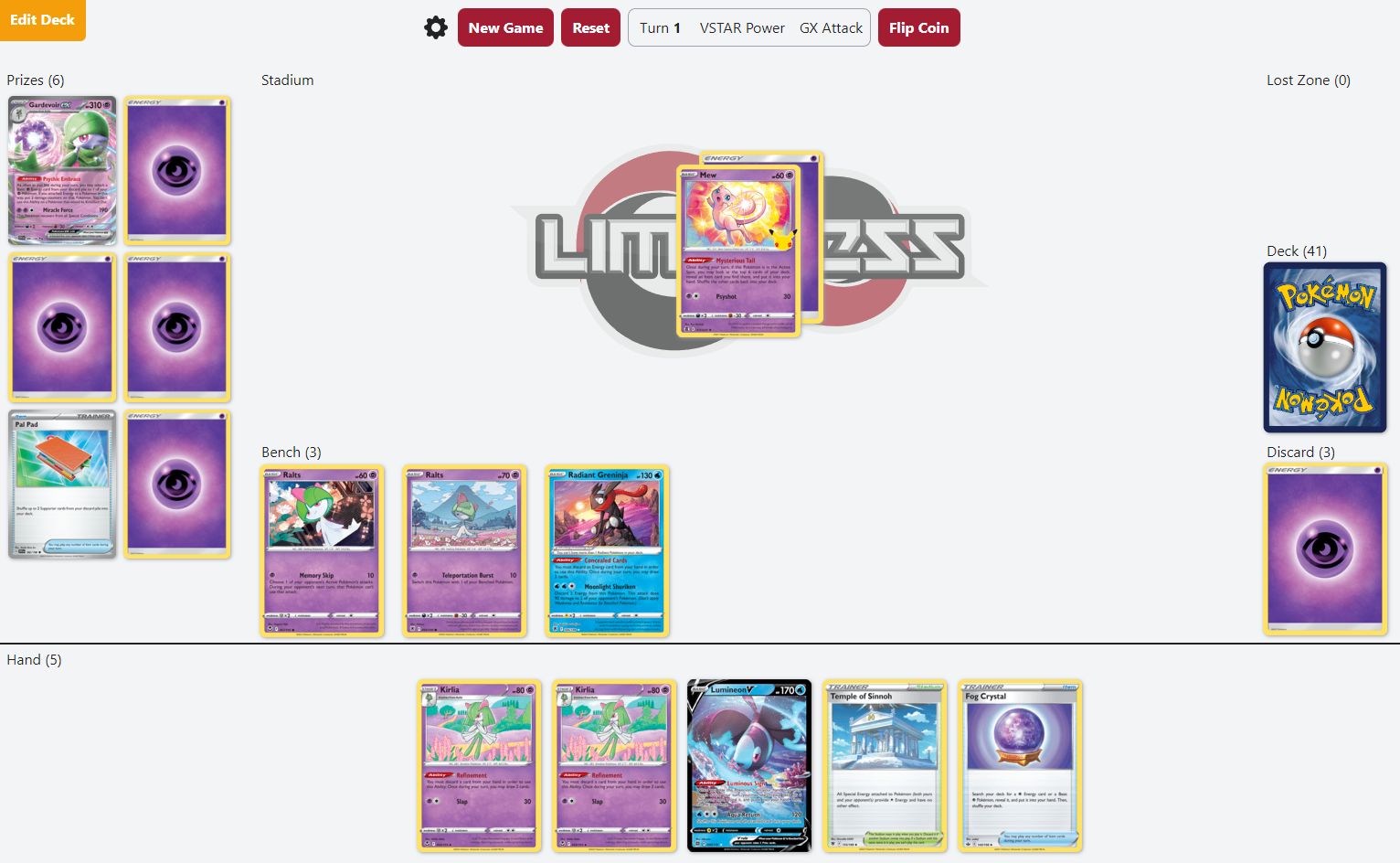Proxy Printer

The proxy tool can be used to print out card images for testing and casual play. They are sized to cleanly fit in a standard sized sleeve in front of a regular card.
The first option for selecting what cards to print is the card search, which works just like the site-wide search bar. If you want to input multiple cards at once, use the List input option. Simply paste in a PTCGL export, or manually type in the cards you want, starting with the desired count.
To remove a card from the print sheet, click on it.
List input tips
You do not need to specify set and number for every card if it is already uniquely identified with less information, or if you don’t care about which print of the card is selected. If you enter only the card name, the newest card with that name will be added to the print sheet. Instead, or in addition to the set code, you can append FA (Full Art) or AA (Alternate Art) to prioritize that style of art if available.
Swiss Calculator

SwissCalc is a tool for tournament players that approximates results of Swiss-system tournaments. This information can be useful for a number of decisions, particularly about intentional draws and drops.
The default setting uses up-to-date official Play! Pokémon tournament guidelines to determine the tournament structure based on the amount of players and type of event. However, you can also use this tool for unofficial tournaments with different structures, or any kind of Swiss tournament, by creating a custom tournament set-up (see below).
Besides the amount of players in the tournament, you also need to enter the tie-rate that should be used during the calculation. In typical best-of-one 30 minute rounds, ties are very rare, so you can leave it as zero. For best-of-three 50 minute rounds, values around 10-15% are normal, varying between formats and tournaments. In general, a lower tie-rate means the point threshold will be higher, so when in doubt pick a slightly lower one. Intentional draws are not counted towards the tie-rate, only natural ties.
When intentional draws are enabled, the calculator will determine which scores, under normal circumstances, are safe to tie during the last round. You can expand this onto the last two rounds by checking the second checkbox. IDs before the last two rounds are never taken into account as they don’t typically make sense. The risky ID option assumes players will intentionally draw even if it doesn’t guarantee them a spot in the next phase, as long as the chance to advance is relatively high (> 2/3 of players with the score).
Custom tournament structures
Enter the amount of rounds for every Swiss phase of the tournament. The fields #Players and Points determine how players progress between phases. If a point total is set, all players with at least that amount of points will advance to the next phase. If a top cut number is set, that exact amount of players from the top of the standings move on. If both are set, all players with the selected point total will always advance, but in case they are less than the cut number, that one takes precedence, and some players will less points advance as well.
For example, the settings for a regular sized Regional Championships would be:
Rounds: 9, Points: 19, Players: 32 -> Rounds: 5, Players: 8. (points per win: 3, points per tie: 1)
Only enter the tournament’s Swiss phases. If the last entered phase has phase progression settings, it is automatically assumed there is a final single (or double) elimination phase at the end. If the last phase does not have progression settings, it is assumed the tournament consists of only Swiss phases, with final standings determined by the total score.
Image Generator

With the Image Generator, you can convert a written decklist into a picture. You can also create a downloadable image that’s optimized to be shared on social media.
Japanese cards that are not released internationally yet can be added by entering their translated names. If the card shares its name with an already existing card, you need to also include the japanese set code as found in the card database.
- Sort decklist sorts the input by card type and counts. If unchecked, cards are left in the order they are entered.
- If Use default art is checked, all cards are replaced by their most recent regular art print. Additionally, if the input contains multiple prints of the same card, their counts are combined into one.
Combining both options does for example make PTCGL exports easier to look at, since they are otherwise unordered and can contain distracting prints like Rainbow Arts.
Opening Hand Calculator

The DrawCalc tool lets you calculate various opening hand probabilities, which can be useful for deck building decisions. Simply enter the information about your decklist and it will show you the available probabilities.
Note that the Supporters field can be used for any non-Basic Pokémon cards (the chance to open a Supporter is a popular use case). If for example you wanted to calculate the chances to open with at least one of your 12 Energy cards (including the first draw for turn) in your deck with 11 Basic Pokémon, you’d enter it like in the picture above and get the result of 83.69%.
Tabletop

The Tabletop tool can be used to practice opening hands and turns, or even play out complete games against yourself. It is made for use with mouse + keyboard, and does not support mobile. All important actions have a keyboard shortcuts, and you can drag cards around from one place to another.
To use japanese cards that have not been released internationally yet, enter their card name, as well as the japanese set code (as it appears in the card database) if a card with same name already exists.
You can find a summary of all keyboard shortcuts here.
Note: This tool has since been integrated into our deck builder. You can still use the old standalone version, however we recommended to switch to the actively maintained new one.
External Links
In the following we’ve listed some sites with useful features or content that you can not find on Limitless. Keep in mind that we are not in any way affiliated with them — if you find any errors, have suggestions, or similar, please contact them directly.
- Pokedata: Many useful tools like detailed tournament standings, Championship Point rankings, and an event locator.
- JustInBasil: Collection of various useful resources and guides.
- Pokémon Deck Utils: Collection of small tools like a prize tracker for online play.
- Retro Pokémon TCG: Blog about the history of the game, decks and strategies from 1999 to 2016, written by 3-time World Champion Jason Klaczynski.
- Pokémon TCG Archive: Tournament results and decklists for formats until 2013.
